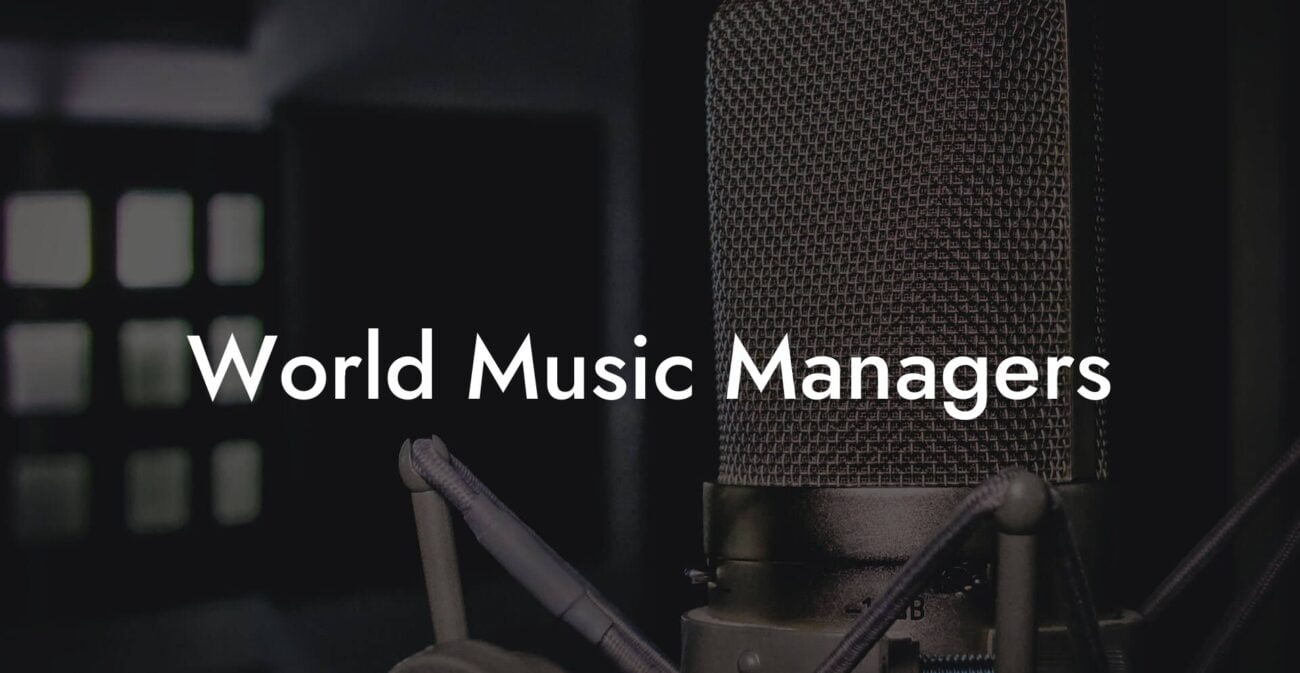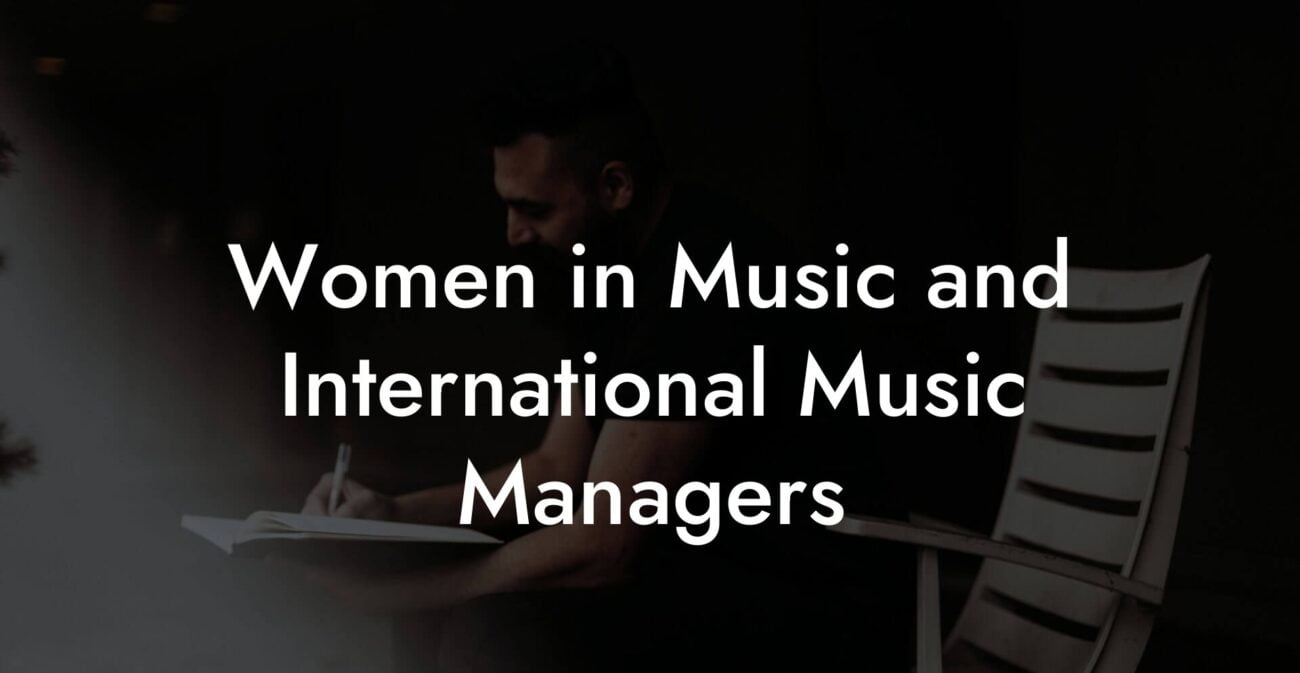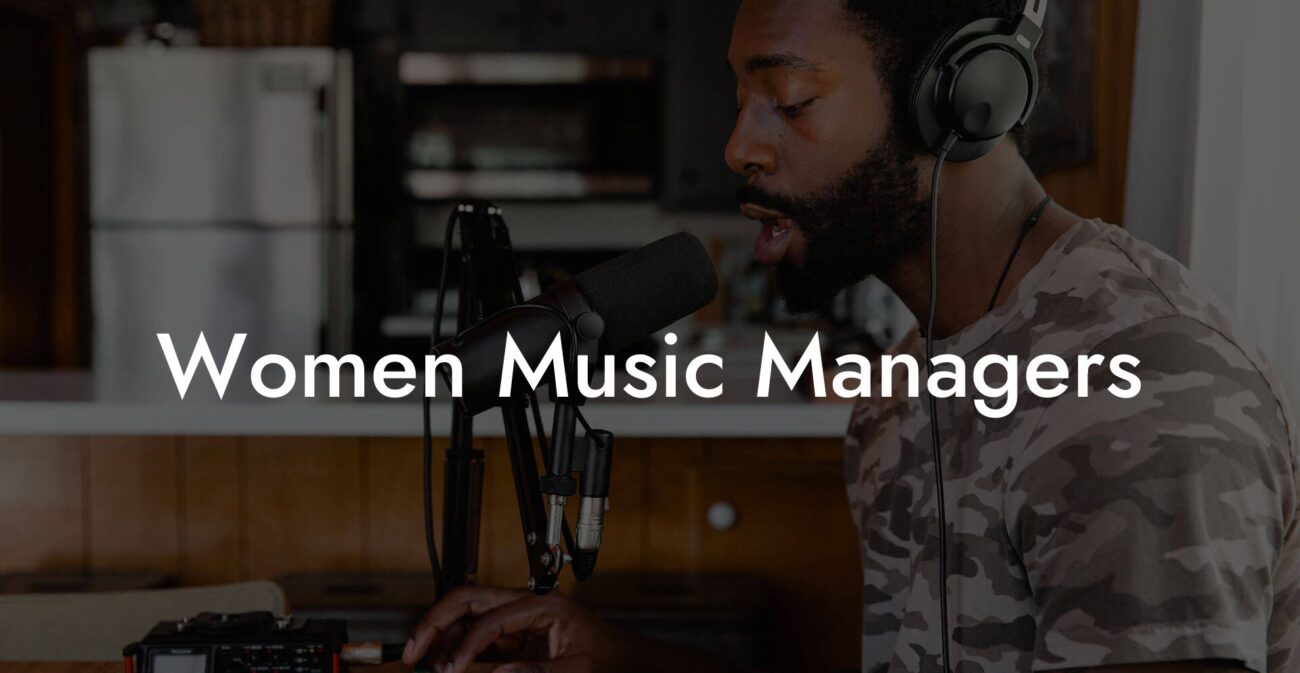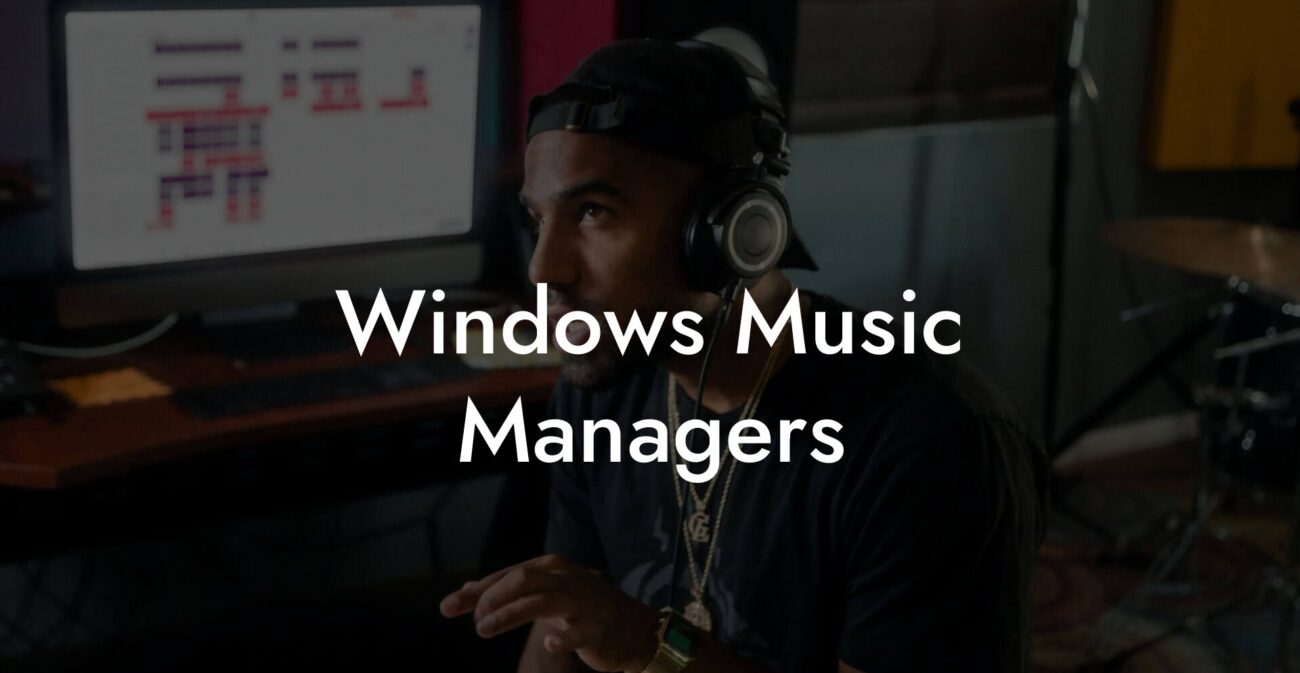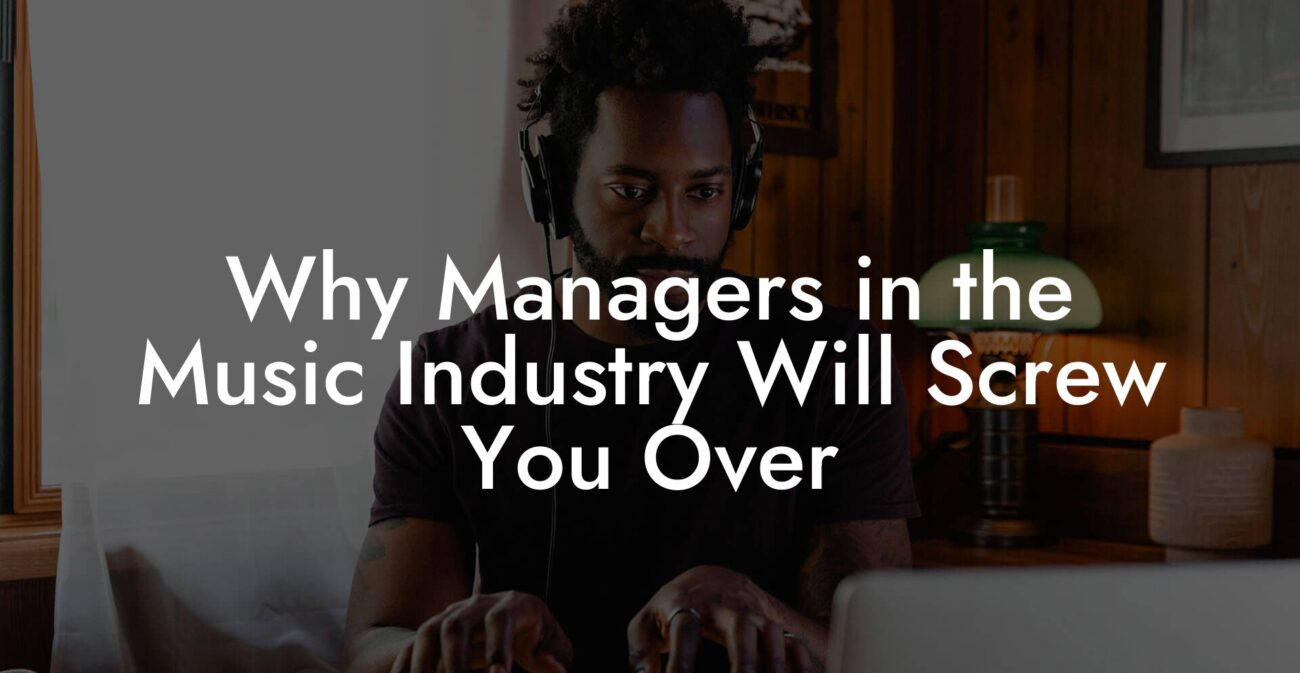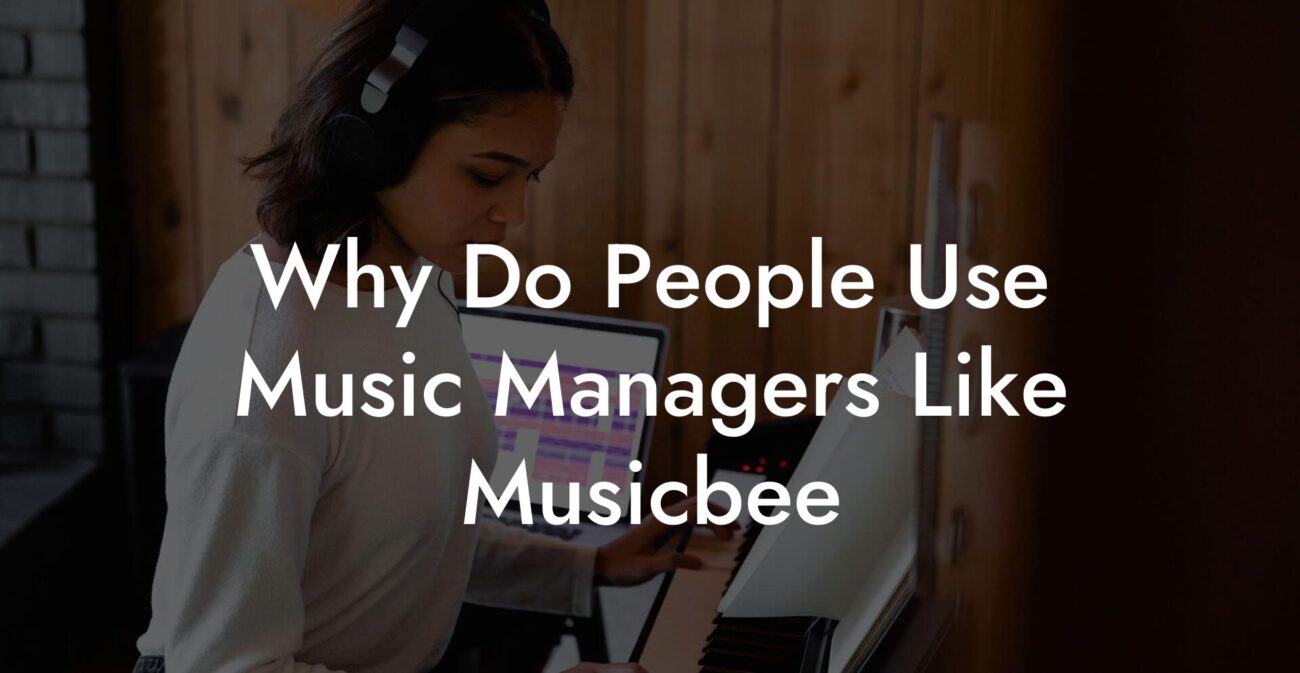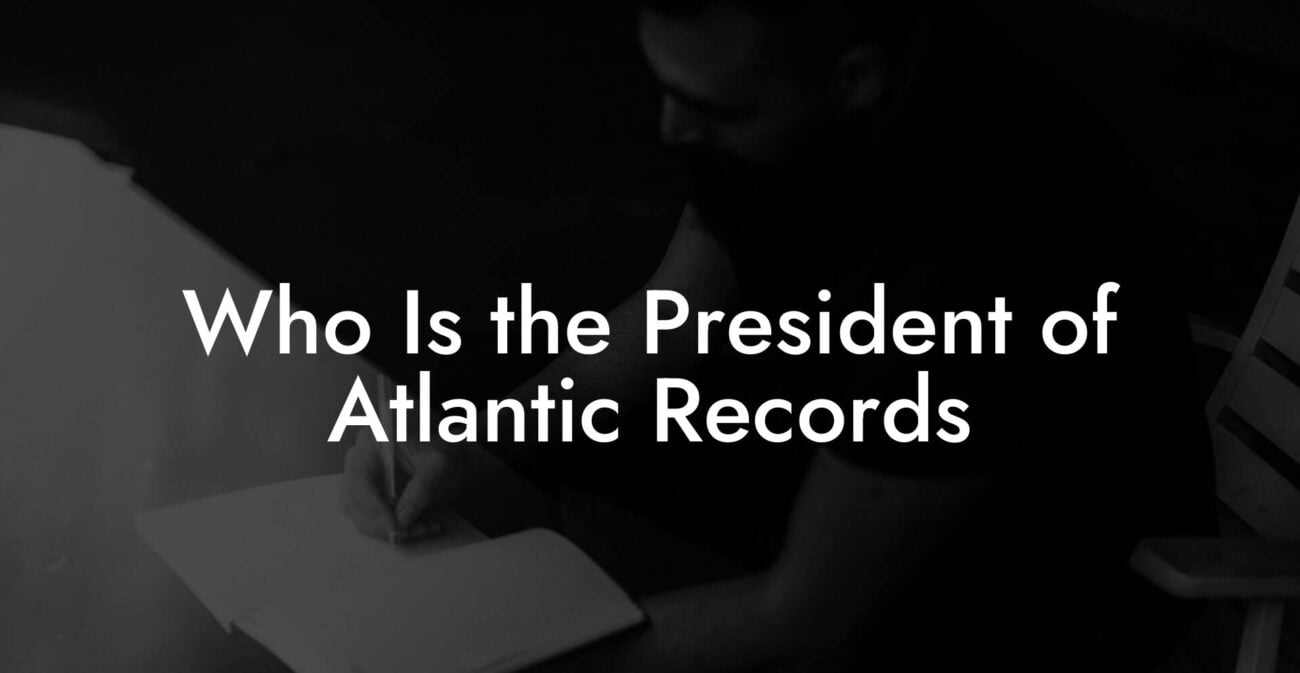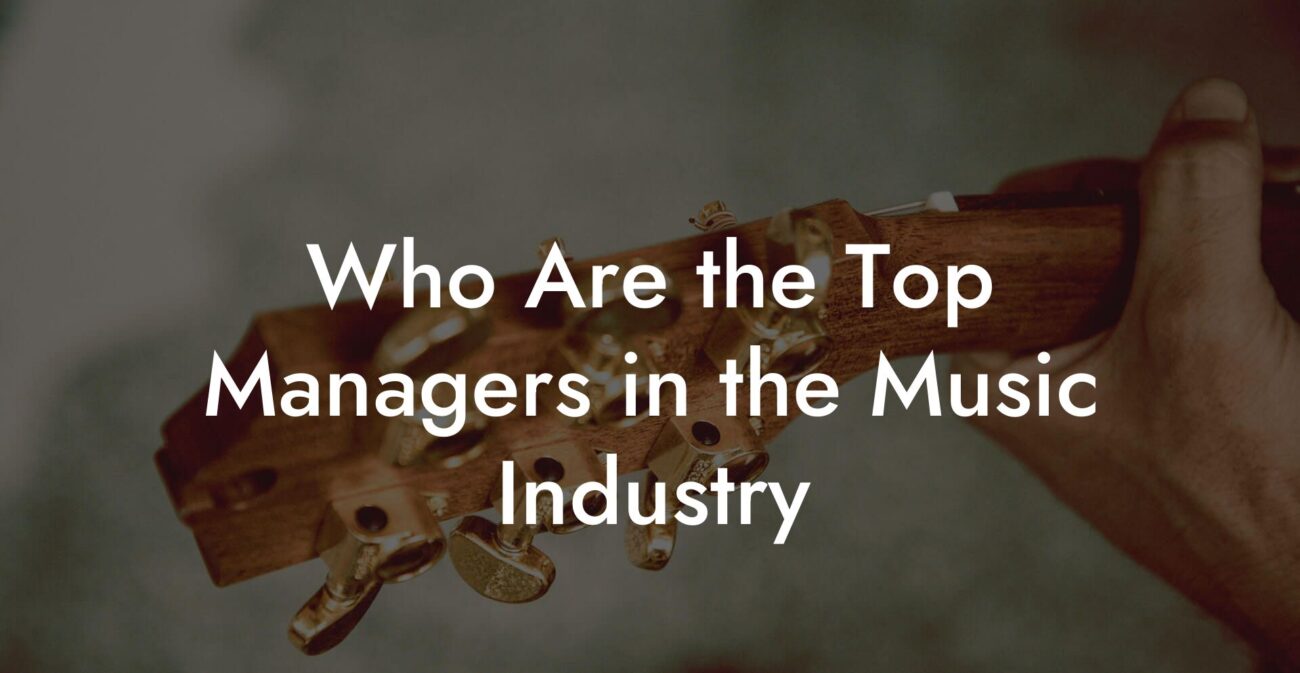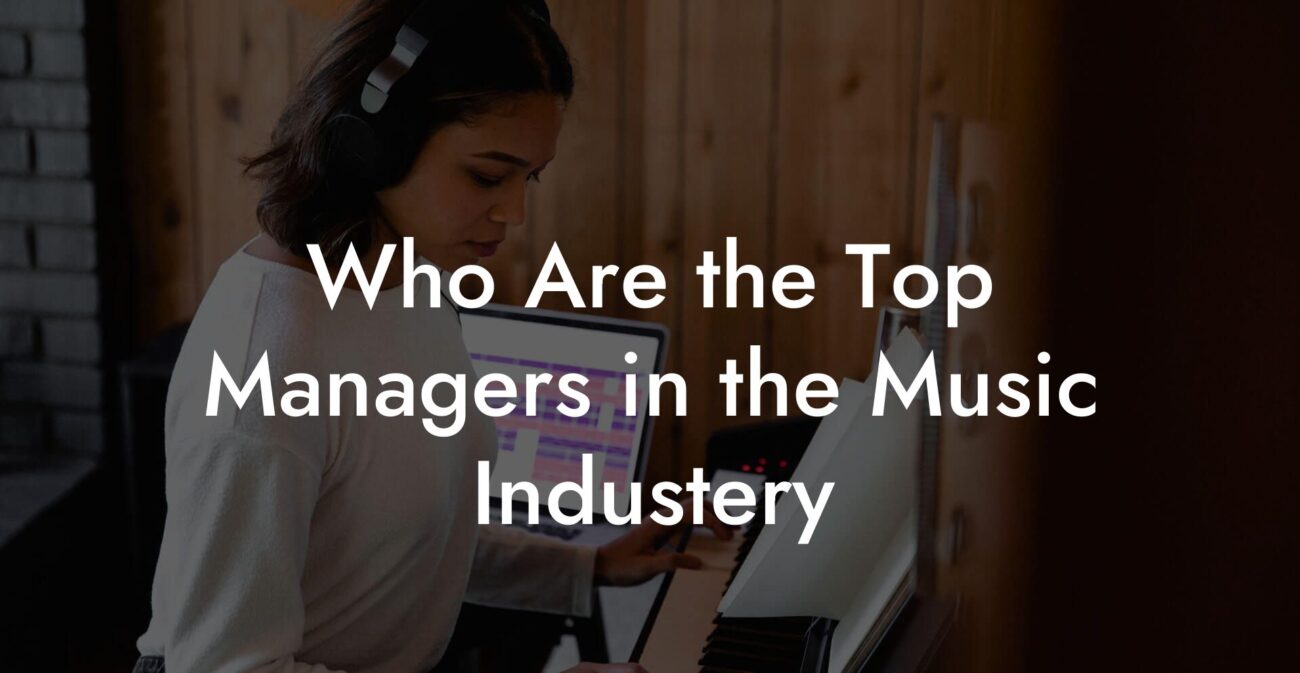Songwriting Advice
Worst Music Managers
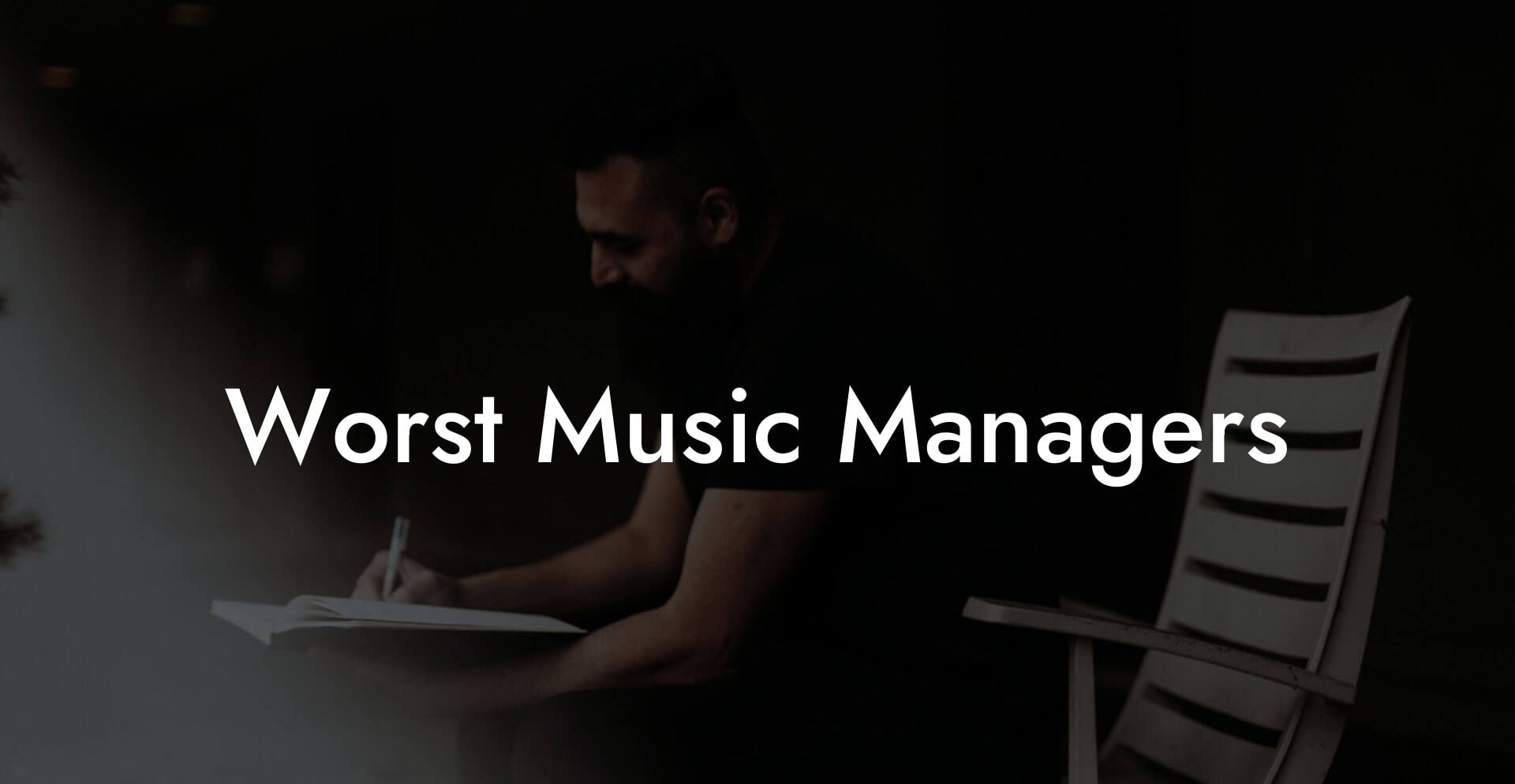
Ever felt like your music career is in the hands of someone who treats your passion like a bad mixtape? Welcome to the wild, chaotic, and sometimes downright disastrous world of the worst music managers. Whether you're an indie artist dreaming of chart-topping hits or a bedroom songwriter perfecting your craft, understanding how to dodge the toxic tendencies of bad management is key. This guide spills the tea on those infamous managers who over-promise, under-deliver, and sometimes even steal the spotlight from their own clients, all while leaving a trail of broken dreams and bank accounts in disarray.
Quick Interruption: Ever wondered how huge artists end up fighting for their own songs? The answer is in the fine print. Learn the lines that protect you. Own your masters. Keep royalties. Keep playing shows without moving back in with Mom. Find out more →
Quick Interruption: Ever wondered how huge artists end up fighting for their own songs? The answer is in the fine print. Learn the lines that protect you. Own your masters. Keep royalties. Keep playing shows without moving back in with Mom. Find out more →
Quick Links to Useful Sections
- What Makes a Music Manager Truly Terrible?
- The Anatomy of a Terrible Music Manager
- Shady Practices: Recognizing Red Flags in Music Management
- 1. The “Too-Good-to-Be-True” Promise
- 2. Molded Contracts That Squeeze the Artist
- 3. Ghosting in the Midst of Crisis
- 4. Cash Flow Conundrums
- Stories of Infamous Music Management Disasters
- The Over-Promised Dreamer
- The “Network” Mirage
- The Dictator of Creativity
- How to Spot a Toxic Music Manager: Your Artist’s Survival Guide
- Navigating the Music Industry: Learning from the Worst to Forge a Brighter Future
- Building a Better Partnership: What to Look For in a Music Manager
- Resources and Community Support: Your Next Steps
- The Impact of a Bad Manager on Your Creative Journey
- Strategies for Reclaiming Control Over Your Music Career
- Reflections on the Modern Music Landscape
- The Future of Music Management: Trends to Watch
- FAQs: Your Burning Questions About Terrible Music Managers Answered
- Your Journey to Empowering Music Management and Creative Freedom
What Makes a Music Manager Truly Terrible?
Picture this: you're at a gig, rocking out on stage, when backstage you discover that your manager has been working a different angle, promising the moon to record labels while handing you a handful of decaf coffee contracts. The worst music managers are those who not only have a knack for overcomplicating things, but also for keeping artists in the dark about the real state of their careers. These managers are the masters of illusion, using flashy terminology and ambiguous promises to mask their disorganization and, let’s be honest, sometimes downright shady intentions.
At the core, a terrible music manager is someone who fails to build the right bridges and instead burns opportunities before they even see the light of day. They might procrastinate on securing gigs, mishandle finances, or simply take advantage of their artists by pocketing commissions far beyond the norm. For new musicians and even seasoned pros, differentiating between a dedicated professional and a management nightmare can feel like deciphering a cryptic lyric in an experimental track.
But don't worry, by the end of this guide, you'll be equipped with the insider knowledge to spot these toxic trends from a mile away and steer clear of management mayhem.
The Anatomy of a Terrible Music Manager
To dodge a bad deal, it's vital to understand what exactly goes wrong with a disastrous management team. The worst music managers share several key characteristics that can derail a promising music career:
- Overpromising and Underperforming: They tell you that you're the "next big thing" but consistently fail to secure meaningful opportunities, leaving you stagnant while they chase unrealistic deals.
- Financial Fly-by-Nights: Mismanaging funds, cutting corners on contracts, and often mysteriously disappearing with a portion of your earnings are hallmark signs of a manager who isn’t in it for your success.
- Lack of Transparency: From vague contracts to undisclosed meetings with record labels, poor managers tend to keep you in the dark about your own career finances and upcoming gigs.
- Non-existent Network: A manager who can’t connect you with industry professionals is worth their weight in broken-promises. Their “connections” are usually as impressive as a MySpace page from 2005.
- Communication Breakdown: Ever feel like you're shouting into a void? That’s because these managers miss important calls, emails, and texts, leaving you wondering if your career is on mute.
- Toxic Ego and Control Freak Behavior: They often impose their own creative vision over what you genuinely want, dictating every single move without listening to your input. Your voice ends up as one of many drowned out by their inflated sense of expertise.
Understanding these red flags is the first step in protecting your musical journey from spiraling into a management mess. While every manager may have a bad day here and there, repeated patterns of these behaviors are serious warning signs.
Shady Practices: Recognizing Red Flags in Music Management
The music industry has seen its fair share of shady deals and even shadier managers. It's not uncommon to hear rumors about managers who secretly sign multiple artists to the same deal or those who wash their hands off financial responsibilities faster than you can say "royalties." Here’s a closer look at some of those notorious tactics:
1. The “Too-Good-to-Be-True” Promise
If a manager promises you the world with minimal effort on your part, be skeptical. These are usually the same people who make grand promises about viral hits and instant fame, even though the only viral content they’ve produced so far is that embarrassing tweet from 2010.
2. Molded Contracts That Squeeze the Artist
Ever read a contract that made you feel like you just signed away your firstborn? Contracts laden with legal jargon, hidden fees, or clauses that disproportionately favor the manager are a major red flag. A healthy artist-manager relationship should have transparency at its core, not fine-print traps waiting to snatch away your creative rights.
3. Ghosting in the Midst of Crisis
A reliable manager should be like your favorite bassline: always present, holding things together. But the worst managers tend to vanish when the going gets tough. Whether it's a cancelled tour or an unexpected scandal, if your manager is nowhere to be found when you need them most, it’s time to reconsider the relationship.
4. Cash Flow Conundrums
Money matters in the music world aren’t a mystery. When a manager fails to keep accurate records or delays payments without explanation, it’s a sign that they might be more interested in padding their wallet than promoting your music. Your creative output should never come at the cost of financial uncertainty.
Recognizing these shady practices early on can save you the grief of a stalled career and a bruised reputation. Trust your gut, ask the tough questions, and remember: no gig is worth compromising your integrity.
Stories of Infamous Music Management Disasters
Nothing drives a point home like a few legendary tales from the music world. Over the years, there have been countless cautionary tales of artists whose careers were derailed by management mishaps. Here are some stories that have become almost mythic in the annals of music history:
The Over-Promised Dreamer
Take Jake, a soulful singer-songwriter rising on the indie scene. His manager Ozzie promised him radio play and viral social media campaigns. But instead of connecting him with reputable radio stations, Ozzie booked him for a series of gigs at seedy dive bars with more spilled drinks than fans. Even worse, contracts were signed under duress, giving Ozzie a cut of every cent from a career that had barely taken off.
Despite his undeniable talent, Jake’s career stalled as the reality of Ozzie’s mismanagement set in. The dream of hitting the big time turned into a financial nightmare, leaving Jake with little more than a cautionary tale to share with aspiring artists.
The “Network” Mirage
Then there’s the story of Tia, a bold, boundary-pushing pop artist who believed her manager’s claim of having a “massive network” in the industry. It turned out that his network was about as extensive as a dial-up modem connection. When booking opportunities dried up and financial support became sporadic, Tia realized she had been misled by a manager whose real talent was in spinning tall tales.
Tia’s case serves as a stark reminder that a manager’s network isn’t measured by the number of names they can drop, but by the tangible results they produce.
The Dictator of Creativity
And who can forget the saga of Lucas and his so-called “visionary” manager, Darren? Darren was so intent on imprinting his personal artistic vision on Lucas that every recording session felt like a battle for creative control. Lucas's original style, once a refreshing blend of genres, was slowly morphing into something unrecognizable, all in the name of Darren’s outdated musical tastes.
Lucas eventually broke free, but not without scars. His journey to reclaim his sound has since become an inspirational story for musicians striving to maintain their authenticity in the face of overwhelming managerial dominance.
These stories aren’t just gossip, they’re valuable lessons underscoring the vital importance of choosing a manager who aligns with your vision and values.
How to Spot a Toxic Music Manager: Your Artist’s Survival Guide
Knowledge is power, especially when it comes to safeguarding your music career. Here’s a checklist to help you navigate the treacherous waters of music management and avoid toxic partnerships:
- Ask for References: A reputable manager will have a track record of success. Don’t be afraid to chat with their former or current clients to gauge whether they deliver on their promises.
- Review the Contract Carefully: Ensure that every clause is fair and transparent. If something seems off or overly complicated, consult with a legal expert before signing on the dotted line.
- Communication is Key: A reliable manager should be proactive, responsive, and clear in their communications. If you’re frequently left in the dark, consider it a red flag.
- Financial Transparency: Your manager should provide detailed accounting of earnings and expenditures. Vague explanations about money movements are a telltale sign of potential mismanagement.
- Shared Vision: Ensure your manager understands and respects your artistic identity. Their role is to support and amplify your unique voice, not to impose their personal style on your music.
- Track Record: Look into past successes. A manager with verifiable achievements in the industry is far more reliable than one with empty boasts and no measurable results.
- Gut Feeling: Sometimes, instinct is the best indicator. If something feels off about your interactions, it might be worth rethinking your partnership before committing fully.
Using this checklist, you can avoid the pitfalls that have derailed so many otherwise promising careers. Instead, align yourself with someone who truly champions your musical journey.
Navigating the Music Industry: Learning from the Worst to Forge a Brighter Future
The harsh lessons learned from interactions with terrible music managers can eventually guide you toward making smarter, more informed decisions. The music industry is a labyrinth of shifting trends, power plays, and unpredictable opportunities. It’s a space where every artist must be both a creative genius and a savvy businessperson.
By understanding what didn't work for others, you can better prepare yourself to forge partnerships that are mutually beneficial. Learn from the disastrous stories of over-promised dreams and toxic control, using them as cautionary tales rather than reasons to be cynical. Every setback is an opportunity to sharpen your instincts and define what you need in a true management partner.
Consider the stories of Jake, Tia, and Lucas not as burdens, but as valuable lessons that illuminate the path forward. In a music career filled with twists and turns, a well-informed decision regarding management can be as pivotal as that killer track you just wrote.
The truth is, while bad music managers are notorious for their failings, they inadvertently set the stage for artists to learn, grow, and ultimately demand better from those who handle the business side of their creative endeavors.
Building a Better Partnership: What to Look For in a Music Manager
If navigating the pitfalls of music management has you feeling like you need a GPS to avoid recurring disasters, fear not, there are plenty of great managers out there who understand that your success is their success. Instead of dwelling on the missteps of toxic managers, let's flip the script and highlight the qualities of a management dream team:
- Integrity and Transparency: Look for a manager who is open about every decision, from finances to booking strategies. Transparency builds trust, which is the foundation of any strong professional relationship.
- Strong Industry Connections: A manager with a proven network can open doors to performance opportunities, collaborations, and media coverage. Their connections should be verifiable and yield tangible results.
- Passion for Your Music: Your manager should celebrate your artistic voice while challenging you to reach new heights. A passion for your craft often translates into a dedicated effort to push your career forward.
- Strategic Vision: The best managers think long-term. They’ll help you map out a career path that balances immediate opportunities with sustainable growth, ensuring you’re not just a flash in the pan.
- Excellent Communication Skills: Regular updates, clear strategies, and open lines of communication ensure that you're always on the same page, even when the industry throws unexpected curveballs your way.
- Financial Accountability: A manager committed to ethical practices will ensure that every dollar earned is accounted for and that you’re never left wondering about your royalties or earnings.
Finding a manager who embodies these qualities can transform your music career from a series of trial-and-error experiences into a well-charted ascent to success. When you couple the right management with your creative genius, there’s no limit to where your music can go.
Resources and Community Support: Your Next Steps
While the tales of terrible music managers might leave you a bit wary, remember that the music community is full of supportive peers, professionals, and resources ready to help you thrive. Here are some steps to ensure you’re setting yourself up for success:
- Join Music Forums and Social Groups: Engage with communities on platforms like Reddit, Discord, or Facebook groups where artists discuss their experiences and share advice about management, gigs, and creative collaborations.
- Attend Industry Workshops and Conferences: These events are golden opportunities to meet experienced managers, lawyers, and other music professionals who can provide guidance and foster valuable connections.
- Utilize Educational Platforms: Websites and online courses focused on music business, copyright law, and digital marketing can offer that extra edge, ensuring you're fully equipped to navigate the often murky waters of the music industry.
- Network with Fellow Musicians: Often, the best advice comes from those who have walked the path before you. Share your experiences, seek mentorship, and support each other in recognizing and avoiding management pitfalls.
- Leverage Technology: Tools like Lyric Assistant not only help you write lyrics but also connect you with a network of like-minded creatives. Embracing innovative digital solutions can streamline your creative process and free up mental space to focus on the big picture, your music career.
- Research and Vet Managers Diligently: Before signing any deal, take your time to do your homework. Use trusted resources, ask for referrals, and never be afraid to walk away from an offer that doesn’t feel right.
Every successful artist knows that a solid support system is as important as raw talent. By tapping into these resources and surrounding yourself with people who have your best interests at heart, you’ll be well-armed to sidestep the pitfalls of awful management and instead forge partnerships that propel you to new heights.
As you move forward, remember that your music is worth every ounce of effort you put into protecting it. Empower yourself with knowledge, network strategically, and never settle for anything less than a management team that champions your every beat.
The Impact of a Bad Manager on Your Creative Journey
Let’s get real: having a terrible music manager can feel like trying to stream your favorite song on dial-up internet, frustrating, slow, and a surefire way to ruin the vibe. A bad manager can leave your creative process in tatters, stifling your artistic expression while you grapple with contract disputes, unreturned calls, and financial mysteries.
When you’re busy trying to fix problems that should never have existed, where is the time for songwriting, rehearsals, or even a quick brainstorming session for your next hit? The energy spent on managing crises and handling unkept promises can drain your passion and leave you feeling like your creativity is being hijacked.
But every setback is also a set-up for a comeback. Every time you dodge a bullet from a notorious manager, you gain more insight into what to expect, and crucially, what to avoid, in future partnerships. In this sense, every frustrating experience can be transformed into a stepping stone toward finding that perfect match who not only respects your artistry but also magnifies your creative reach.
Strategies for Reclaiming Control Over Your Music Career
So, what happens after you’ve been burned by a bad manager? The next step is reclaiming your creative independence and forging a path that speaks true to your artistry. Here are some strategies to ensure that your music career remains under your control:
- Educate Yourself on Music Business Basics: Knowledge is your best ally. From contract law to revenue streams, making yourself familiar with the ins and outs of the music industry can empower you to make informed decisions.
- Set Clear Boundaries: Whether it’s outlining your creative direction or regulating communications with your management team, setting clear boundaries from the start is vital. Don’t be afraid to enforce these rules, your art deserves it.
- Collaborate with Trusted Advisors: A good lawyer, an honest accountant, or a fellow musician who has navigated similar challenges can be invaluable. Lean on your network and don’t try to go it alone.
- Take Control of Your Digital Presence: In today’s digital world, your online presence is an extension of your brand. Use social media, streaming platforms, and digital tools like Lyric Assistant not only to promote your music but also to maintain direct communication with your audience.
- Learn from Past Mistakes: Every misstep is a lesson. Document what went wrong, identify the red flags, and use that insight to build a more robust strategy for the future.
Every artist deserves a management team that respects and enhances their creative process. By taking steps to educate yourself and assert control over your music career, you’re not just avoiding the pitfalls of the worst music managers, you’re paving the way toward a future filled with authentic, uncompromised art.
Reclaiming control after a setback might feel like you’re starting over, but every great comeback story starts with a moment of clarity and determination. Your journey toward artistic freedom begins with each proactive step you take today.
Reflections on the Modern Music Landscape
Today’s music landscape is a vibrant mix of spontaneity, digital innovation, and endless possibilities, if only you can navigate the minefield of management mishaps. With social media platforms, streaming services, and easily accessible production tools, the power to create and share your art has never been greater. And yet, with these advancements come new challenges: fake gurus, digital schemers, and managers whose outdated tactics can quickly become liabilities rather than assets.
The worst music managers of today are the ones who cling to obsolete practices in a world that’s constantly evolving. They’re the proverbial vinyl in a Spotify era, a relic that fails to streamline modern success. Understanding this dynamic is crucial. The artists who thrive are those who adapt, evolve, and choose partnerships that propel them forward rather than hold them back.
As you move deeper into your musical journey, remember that every misstep turns into a learning opportunity. Embrace the spirit of innovation, invest in your growth, and insist on professionalism that mirrors the cutting-edge nature of today’s music scene. Your art deserves managers who are as progressive and dynamic as your creative vision.
The Future of Music Management: Trends to Watch
As the industry evolves, so does the role of the music manager. The future is riddled with possibilities: virtual management teams, AI-driven analytics for gig bookings, and platforms that integrate every aspect of an artist’s career seamlessly. But with progress comes the risk of new forms of mismanagement.
Here are some trends to keep an eye on:
- Tech-Driven Transparency: With blockchain and cryptocurrency infiltrating the industry, expect a future where financial transactions and contracts are completely transparent, reducing the scope for financial mismanagement.
- Remote Management: Remote working is no longer a perk but a norm. Look for managers who are equally adept at leading virtual teams, maintaining communication, and leveraging global networks.
- Data Analytics: The best managers are those who utilize data to drive decisions, from identifying the best gigs to fine-tuning social media strategies. If a manager can prove their success with clear metrics, they’re worth paying attention to.
- Sustainability and Ethical Practices: The modern audience values authenticity and responsibility. Managers who prioritize ethical practices, both creatively and financially, are poised to win in the long run.
While technological advancements promise a more streamlined future for music management, the timeless qualities of transparency, accountability, and genuine passion remain non-negotiable. Stay informed, stay critical, and never stop demanding excellence from those who represent you.
FAQs: Your Burning Questions About Terrible Music Managers Answered
We know that navigating the maze of music management can raise a ton of questions. Here, we’re tackling some of the most frequently asked questions about the worst music managers and what you can do to steer clear of their pitfalls.
1. How can I identify a potentially toxic music manager early on?
Look out for red flags like vague or overly complicated contracts, a history of unreturned communications, and promises that seem too good to be true. Always ask for references and do your due diligence before signing any agreements.
2. What financial warning signs should I be aware of?
Be cautious if your manager is not transparent with earnings, delays payments, or deducts excessive fees without clear justification. Accurate financial records and regular updates are crucial.
3. Is it normal for managers to have creative opinions that differ from mine?
While healthy debate is part of the creative process, a manager who insists on overriding your artistic vision or forces you into a style you don’t connect with might be more interested in their own agenda than yours.
4. How do bad music managers impact my long-term career?
A toxic manager can stunt your career growth by mismanaging finances, stifling your creativity, and even damaging your reputation. The wrong manager can lead you down a path of missed opportunities and long-term setbacks.
5. What steps can I take to break free from a bad manager?
First, educate yourself about your contractual rights. Consult with legal and financial experts, and consider networking with fellow artists who've overcome similar challenges. Document everything and plan your exit strategy carefully.
6. Are there any technological tools that can help me manage my career better?
Absolutely. Platforms like Lyric Assistant not only streamline your songwriting process but can also help you connect with fellow professionals, track your progress, and gain insights into the industry to avoid poor management practices.
7. How important is networking in finding a reliable manager?
Networking is crucial. Personal recommendations and community feedback can often reveal the true character of a manager far better than flashy promises or expensive portfolios.
8. What can I do if I’m already stuck with a bad manager?
Knowledge is power. Educate yourself, consult experts, and, if necessary, explore legal avenues to amend your contract. Surrounding yourself with a reliable network can also provide support as you transition to a better arrangement.
9. How can I ensure transparency and accountability in future management partnerships?
Always insist on written agreements that clearly outline financial arrangements, responsibilities, and communication expectations. Regular check-ins and open communication channels can help maintain transparency.
10. What traits should I look for in a manager who will champion my career?
Look for integrity, a proven track record, genuine passion for your music, strong communication skills, and a commitment to transparency in all professional dealings.
Your Journey to Empowering Music Management and Creative Freedom
Being an artist today means embracing a world where your voice, your lyrics, and your music have the power to move mountains. Yet, along this journey, the influence of the people steering your career can either amplify your sound or muffle it. By learning from the worst music managers, those who have left countless artists frustrated and financially depleted, you’re better equipped to carve out a future where your creativity is celebrated, supported, and given the rightful platform it deserves.
Every setback has taught the industry valuable lessons about trust, transparency, and collaboration. Let the cautionary tales of mismanaged careers inspire you to demand excellence from those who represent you. Instead of settling for mediocre partnerships and empty promises, stand firm in your belief that your music deserves a team that uplifts, nurtures, and propels you forward.
In this ever-evolving landscape of music and management, finding the right support or even knowing what pitfalls to avoid is part of your journey. Equip yourself with knowledge, trust your instincts, and never hesitate to challenge the status quo. After all, the sweetest hits are born from overcoming adversity and turning every glitch into a stepping stone toward brilliance.
So, here's to a future filled with authentic collaborations, dynamic partnerships, and a music career that truly resonates with who you are. Embrace the lessons, share your experiences with fellow artists, and keep your creative spark shining bright, because in a world of bad management, you are your best advocate.
Welcome to your new chapter of empowered, transparent, and passionate music management. Your journey toward creative freedom starts with every decision you make today. Rock on!


